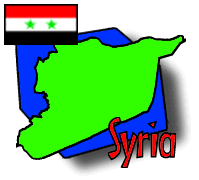| Webmaster's Note: Because the BikeAbout team is traveling in smaller groups for a little while, we have changed the format of the journal slightly. The rider notes for the lead group (today it's the guys, who are traveling from Lebanon to Syria) are followed by notes for the other group(s). When the group rejoins in late February or early March, we will return to the original format for these pages. |
BikeAbout Log
While Corinne and andrEa are still on Rhodes, Anthony, Ethan, and Padraic are traveling from Lebanon to Syria:
topics: border crossing, nutrition, Hafez al-Assad, Middle East wars, history; jump to dispatch

Rider Notes: February 7, 1998
Food of the Day: Carbohydrates
Carbohydrates are an important element in BikeAbout's daily nutritional intake. This is something that has become painfully obvious to the BikeAbout team as they pedal around the Mediterranean.
The human body is, in essence, a machine: Food goes in and energy comes out. When you are engaged in any sort of sustained physical activity, the role of the body as machine is made even more obvious. If you are burning a lot of calories (the body's fuel), you need to replace those calories (or fuel) or soon (very soon in the case of an active individual) your machine will stop. At the level of activity the BikeAbout team is maintaining, skipping breakfast or lunch would mean not being able to bike through the afternoon. We have already talked a little about the role of fat in our diet, but today we are going to talk about carbohydrates, which play an even larger role in fueling the body.
Carbohydrates form the foundation of any diet. Fortunately they tend to be the cheapest and most easily available foods. Carbohydrates come in two different forms: starches and sugars. Starches are found in many vegetables and grains, while sugars are found in plants and fruits. Carbohydrates need to be broken down into glucose (the high-octane jet fuel of the body's cells). This process occurs in the small intestine. As the glucose is absorbed from the small intestine, it passes through the liver (where some of it is stored as glycogen) and then is released into the blood stream. The carbohydrates then form triglycerides with fatty acids, which are easily broken down into energy or stored in something called antipodes as fat for latter use — but that is another bedtime story.
Complex carbohydrates (which include unrefined grains, vegetables, tubers, and fruit, all of which also provide essential vitamins, protein, fat, and minerals to the body) contain the most nutrients. These complex carbohydrates are the food that athletes crave. While biking, the BikeAbout team will continually munch all the complex carbohydrates it can find in order to keep their bikes' "engines" happy and well fueled. The process of loading up on carbohydrates the night before an athletic event has become known as "carbo-loading" and if done properly it can prevent another malady known as "bonking."
Word of the Day: Mish mahoul — "it is not possible"
Mish mahoul  means "it is not possible" in Lebanese Arabic. Today, when Ethan and Padraic tried to cross the border, they were told "Mish mahoul."
means "it is not possible" in Lebanese Arabic. Today, when Ethan and Padraic tried to cross the border, they were told "Mish mahoul."
Tech Fact of the Day: Border Crossings (part #3)
Today the BikeAbouters were again stymied in their attempt to enter Syria. As we have already mentioned numerous times, the Syrian government is particularly picky about visas (see Border Crossings, part #1 and Border Crossings, part #2). Nevertheless, convinced that there HAD to be a way to get into Syria (especially from Lebanon which is "border locked" by Syria), the BikeAbouters asked everyone they knew in Beirut whether or not it was possible to obtain a visa at the border. They even spent an unsightly amount of money calling the American consulate in Damascus, only to have everyone say "mish mahoul" (see the Word of the Day).
Finally, they decided to take the question to the transportation professionals — the bus companies that ply the roads between Damascus, Beirut, and Istanbul. There they soon found someone who said "mahoul." The bus company men said it so easily, and with such surprise that such a silly question would even be asked, that the BikeAbouters were lured into a sense of hopefulness. This was reinforced when they reached Tripoli and the bus companies repeated the "mahoul."
Unfortunately, the border reality was much grimmer. Eventually, only Anthony was able to cross, and even that was lucky because the Syrian reentry visa he had obtained only allowed him to reenter Syria the way he had left — the road to Damascus.
Person of the Day: Hafez al-Assad
Hafez al-Assad became president of Syria in 1971. Born in Qaradaha, Syria, and educated in Syrian and Soviet military colleges, Assad joined the Syrian Baath political party in 1946. When this party came to power, he was promoted to the rank of General of the Air Force. Assad subsequently served as the Defense Minister until, in 1970, he seized power and stepped into the role of Prime Minister. He occupied this role until 1971, when he was elected President. Under Assad's leadership, Syria has been very active in regional affairs, supporting Iran during the Iran-Iraq War and intervening several times in the Civil War in Lebanon.
Having long aligned his country with the Soviet Union, Assad, at the end of the Cold War, shifted his foreign policy towards the West. Syria has long been considered a state that sponsored terrorism (most recently in the downing of the Pan-Am flight over Locherbie, Scotland) and has faced considerable difficulties overcoming this stigma. Recently, great progress was made when they joined the international coalition during the Gulf War, even sending a token military force to fight against Saddam Hussein's army.
A major continuing obstacle to Syria's acceptance by the West is Syria's unwillingness to recognize the existence of the State of Israel. Assad, in support of Egypt during the Yom Kippur War, committed troops to the attack on Israel. He subsequently rejected Egypt's moves towards peace with Israel. While many experts consider a peace agreement between Syria and Israel inevitable, neither side is making much progress towards resolving the problem of the Golan Heights (part of Syria occupied by Israel) or curtailing terrorist attacks on Israel emanating from Syrian-controlled Lebanon.
During the 1980s, there were several attempts on Assad's life, but he has developed a policy of dealing harshly with his political opponents (namely the Muslim Brotherhood) and has created a massive internal security force to deal with the issue. Traveling through Syria, you see Assad's portrait everywhere  , and people seem to think well of him — he won 99.97% of the popular vote during the last election. How much of this enthusiasm is in response to Assad's vaunted internal security apparatus is not apparent.
, and people seem to think well of him — he won 99.97% of the popular vote during the last election. How much of this enthusiasm is in response to Assad's vaunted internal security apparatus is not apparent.
Place of the Day: Tartous
Tartous has long been an important port and remains so today as the second largest in Syria. Known to the Crusaders as Tortosa, its capture by Raymond Pilet and Raymond, Viscount of Turenne, in 1099, greatly strengthened the first Crusade, allowing for the arrival of supplies and communications from Antioch (Antakya, Turkey), Cyprus, and Europe.
A walk around Tartous today leads by glimpses of the fortified city that it once was. 
 The cathedral is a prime example of the defensive architecture of the medieval period. Today it is home to an impressive collection of statues, sarcophagi, and frescos.
The cathedral is a prime example of the defensive architecture of the medieval period. Today it is home to an impressive collection of statues, sarcophagi, and frescos. 
Group Dispatch, February 7

Today the BikeAbout boys team headed for the Lebanese-Syrian border. The research conducted earlier at the bus stations seemed to indicate that it would be possible, in theory at least, for Ethan and Padraic to get a Syrian visa at the border.
Waking early and munching leftover pastries from the night before, the team set out in a chilly rain for the border. Aside from the cold, the rain, and the incessant wind, the ride was a nice spin along the coast. With one other exception: garbage. It seemed as though the entire area was being used as a garbage dump. At times there was garbage on the right of us and garbage on the left of us. Thankfully these sections were downhill — the stench was almost overwhelming. Every once in a while though, the garbage would clear and it was possible to look down upon the beautiful coast and what could potentially be a beautiful beach.
Stopping to fix a flat a few kilometers short of the border, the boys discussed strategy. We have already mentioned the problems that the BikeAbouters have been having getting Syrian visas. Anthony was the only one able to get a visa ahead of time (during the break when he returned to Cairo), so it was decided that if Padraic and Ethan were not allowed to cross the border into Syria, Anthony would leave them and ride on alone for Tartous (see the Place of the Day). Ethan and Padraic hoped that if they were not able to cross at the Tartous crossing, they would be able to do so at one of the two other Syrian-Lebanese border crossings, and would catch up with Anthony. Carefully noting down where Anthony would be staying each night of his visit in Syria, they hoped to reunite during the next few days.
Steeling themselves for the border crossing, the boys rode on. When they had nearly reached the border, it began to rain (again) so hard that they were afraid of missing the crossing point altogether. But, finally, after receiving a fond farewell from the Lebanese border guards, they coasted up to the Syrian border. Originally, the thought was that the rain might add a sympathy factor with the border guards, but it turned out that this desolate, barren, windswept, and miserable stretch of no-man's-land was the closest that Ethan and Padraic would get to Syria. No amount of questioning, pleading and imploring seemed to have any effect. For a brief moment the BikeAbouters considered a bribe attempt, but fearing that the stories they had heard about Syrian prisons were true (nasty food and . . . well . . . unpleasant conditions), they decided it might be wise to resort to plan B.
So, once again, still in the pouring rain, Anthony left Ethan and Padraic at the border and rode on alone into that enchanted land known as Syria. (Padraic and Ethan are extremely jealous over the ease with which Anthony has traveled across the Syrian border, and, not one to miss an opportunity to "rub it in," Anthony might, in the next few days, participate in momentary parenthetical embellishments of the wonders of Syria). The concern evident on Padraic's face (and Ethan's too, although Padraic had been talking about it for months) that he might not be able to see the Crac des Chevaliers touched Anthony deeply, and lingered with him for a few moments as he spun northward.
Almost immediately though, as the terrain changed and Anthony biked into a heavily wooded area  , he forgot about his unfortunate friends. The land was a charming change from the mix of predominantly desert-like landscapes that the BikeAbout team has been biking through during the last three months. About 20 km (12 miles) from Tartous, the rain stopped, the sun came out and the ride, at last, warmed up a little.
In Tartous, after locating a hotel, showering, and changing into warm, dry clothes, Anthony took a quick tour of the Medieval part of town, stopping to visit the 12th-century cathedral, its museum, and the towns charming fishermen's port
, he forgot about his unfortunate friends. The land was a charming change from the mix of predominantly desert-like landscapes that the BikeAbout team has been biking through during the last three months. About 20 km (12 miles) from Tartous, the rain stopped, the sun came out and the ride, at last, warmed up a little.
In Tartous, after locating a hotel, showering, and changing into warm, dry clothes, Anthony took a quick tour of the Medieval part of town, stopping to visit the 12th-century cathedral, its museum, and the towns charming fishermen's port 
 , ending up on the beach to watch the sunset.
, ending up on the beach to watch the sunset. 

Meanwhile, Ethan and Padraic, left at the border, plotted Syrian President Assad's overthrow (see the Person of the Day). Well, not really. But we do all hope for a thawing of relations between the U.S. and Syria so that visas can be made available to goodwill travelers wishing to visit.
After yet another downpour, they turned their backs to Syria and returned to the friendly guards at the Lebanese border. Boy, were the guards surprised to see these two familiar helmet-framed faces . . . and even more so without Anthony. (One guard, when he remarked Anthony's absence, said, "Your friend is no friend." Padraic agreed since he was really jealous, but in their hearts, both Padraic and Ethan knew that Anthony was doing this for the good of BikeAbout and that he would be terribly, terribly lonely without us.)
It took a little explaining to get back through the Lebanese border. You see, Ethan and Padraic had already received exit stamps on their Lebanese visas and did not want to have to pay for new entry visas since they had really never even left the country. Fortunately, the guards, who have probably seen this kind of thing before, were understanding.
On his way through the last check point, Padraic was also told that the next-nearest border, on the road to Homs, Syria, was close enough — and big enough — that it was worth checking into. The duo figured that they had come this far, they might as well try all the angles. So, they turned south, headed into the teeth of the wind that had been at their backs. After a few (7) kilometers (4 mi), they turned back north and covered another 15 km (9 mi) to this other border station.
This time, wise to the potential exit visa stamp tangle, they explained that they were only going to the Syrian border to see if they could get permission to cross the following day, which was indeed the plan. They hoped that the ranking officer would send off a telegram and that the following day they could return, get their visas, and speed off to meet Anthony in Homs. The Lebanese waved them through. But the Syrians, although extremely pleasant, were just as hard-hearted as at the other border. Ethan and Padraic explained their predicament to the ranking officer, who, unlike at the other border, did call some office in Damascus to at least ask about procedure, and then told them that it was completely impossible. Completely, utterly, no-other-way-about-it impossible.
Needless to say, they were crestfallen, crushed, heartbroken. They returned to the Lebanese border (again), explained why they had one cancelled exit stamp from another border and no exit stamp for this one (so much for avoiding the confusing reentry problem) and then hopped into a taxi all the way back to Tripoli. There they agreed that they would have more options in Beirut, so they quickly caught a bus and returned to their old stomping grounds.
Once again, Ethan and Padraic arrived in Beirut after sunset. Before rolling into town, however, Ethan returned to the bus station office that he and Anthony had visited before departing and discussed options for getting a visa through the bus company before trying the border along the road to Damascus. He was told it would not be a problem and that he and Padraic should return at 9 a.m. the next day. This was certainly a boon to their trod-upon spirits.
Through the dark, but now-familiar streets of Beirut they rode and then, having tried Leila and Janine, but not finding them home, called Peter. He was asleep, but his roommate, Oren, warmly welcomed them back to Beirut and into a spare room. Showered and mildly revitalized, Ethan and Padraic pondered the next day and crossed their fingers, hoping for the best.
Meanwhile, the ladies were still exploring Cyprus and Rhodes. You can read about their journey in the February 2-8 dispatch.
Questions? Ask Anthony  !
!



Copyright 1997-2004 BikeAbout. All rights reserved.




![]() !
!



